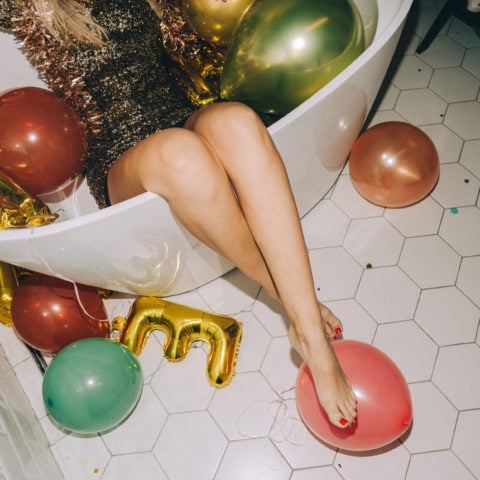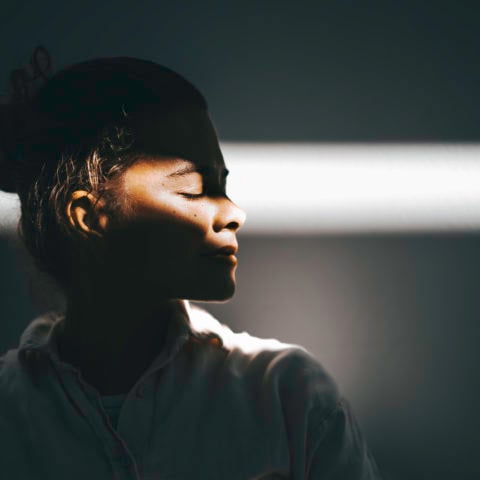Why You Need to Know Transgender Poet, DJ and Artist Juliana Huxtable
Whether it’s the early disco era, New York’s ball culture or Berlin’s post-wall techno scene, clubland has long provided a sanctuary for society’s outliers and marvellous misfits. Growing up in a conservative Bible-belt town—and in a Baptist family to boot—transgender artist, poet and DJ Juliana Huxtable took an early interest in disco ephemera for everything it came to symbolize.
“I’ve always had this outsider obsession with nightlife, the way some people might have an obsession with collecting cars or antiques,” explains the 29-year-old Huxtable. “As a kid, I’d find websites that documented it and was drawn into that world because it’s queer in so many ways. Identity within it is hyper-fragmented and super-diverse. It’s a space one can read as hedonistic and shallow, but it’s also a fertile ground for developing a sense of identity and artistic cross-pollination.”
It’s no mere coincidence that the Bard-educated, New York-based performer and LGBTQ activist—a prominent figure in post-Internet-art circles—frequently acknowledges the World Wide Web in her saturated, subversive and decidedly fluid body of work. Before being confronted with the trolling that regrettably plagues certain corners of the web, she grew up romanticizing the Internet’s potential for inclusivity. “Being who I was, my early years involved being threatened on a regular basis,” she says. “I found my sense of safe space on LiveJournal, Myspace and all those early forms of social media.”
How fitting it is, then, that her avatar-esque experiments in self-portraiture have been embraced by a community of avant-garde artists with a similar predilection for juxtaposing disparate elements. In Huxtable’s world, nods to Lisa “Left Eye” Lopes, J. Edgar Hoover and the artist’s own body might all jostle for space and attention in a piece grappling with surveillance technology, Nuwaubian cosmology or the possibility of post-identity politics. At the influential New Museum Triennial in 2015, Brooklyn artist Frank Benson’s show-stopping 3-D-scanned plastic sculpture of Huxtable’s naked body rapidly became the exhibition’s pièce de résistance, with some art buffs hailing it as a shining example of virtuosity by way of virtuality.
For Huxtable, the blurring of URL and IRL boundaries had been a long time coming by the time she moved to New York in 2010. That’s when she set out to create a positive, difference-friendly space that would celebrate gender experimentation and hybridization, because “there wasn’t anything at the time that fit my idea of what I wanted to see in the world,” she recalls. Needless to say, after-dark denizens everywhere embraced Huxtable’s all-caps SHOCK VALUE parties, which were promoted and archived through websites such as Tumblr—platforms that facilitated meaningful social engagement, she notes.
“As for the things I found frustrating about social media—like ganging up on someone or attacking them for making a silly statement—those kinds of antagonisms tend to dissolve in a party space,” adds Huxtable. “What really excited me about SHOCK VALUE was to be in a city where there could be a direct back and forth between the communities generated online and nightlife as a physical space, which allows these same communities to flourish. It’s truly one of the most productive and desirable aspects of nightlife, if you ask me.”
With a solo show scheduled for the spring at hip Lower East Side gallery Reena Spaulings and a forthcoming book compiling a large chunk of her writings, 2017 will find Huxtable sharing her historically fluctuating, pop-culture-laden mythologies far and wide, both offline and on. Which makes me wonder how she feels about all the fake news, Internet vigilantism and algorithmic bubbles our culture seems swept up in at the moment.
“I think people make tacit assumptions about social media communities, especially when it comes to politics,” she tells me shortly before President Trump’s inauguration. “We’re not all in the same algorithmic bubble, and it has taken recent political events—Black Lives Matter, the war in Syria, the U.S. election, the issue of reproductive rights—to prove that. So I’d say the interesting conversation to be had moving forward revolves around self-selecting audiences. And it’s one we need to have.”








